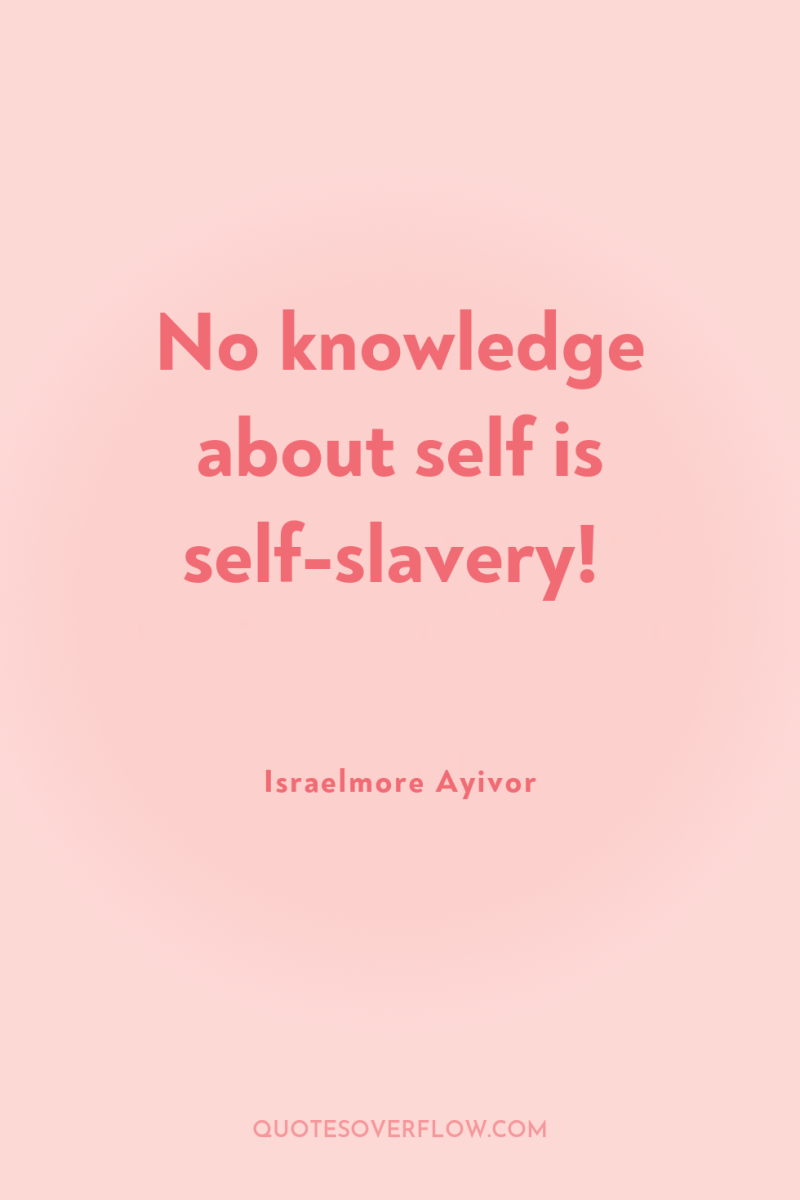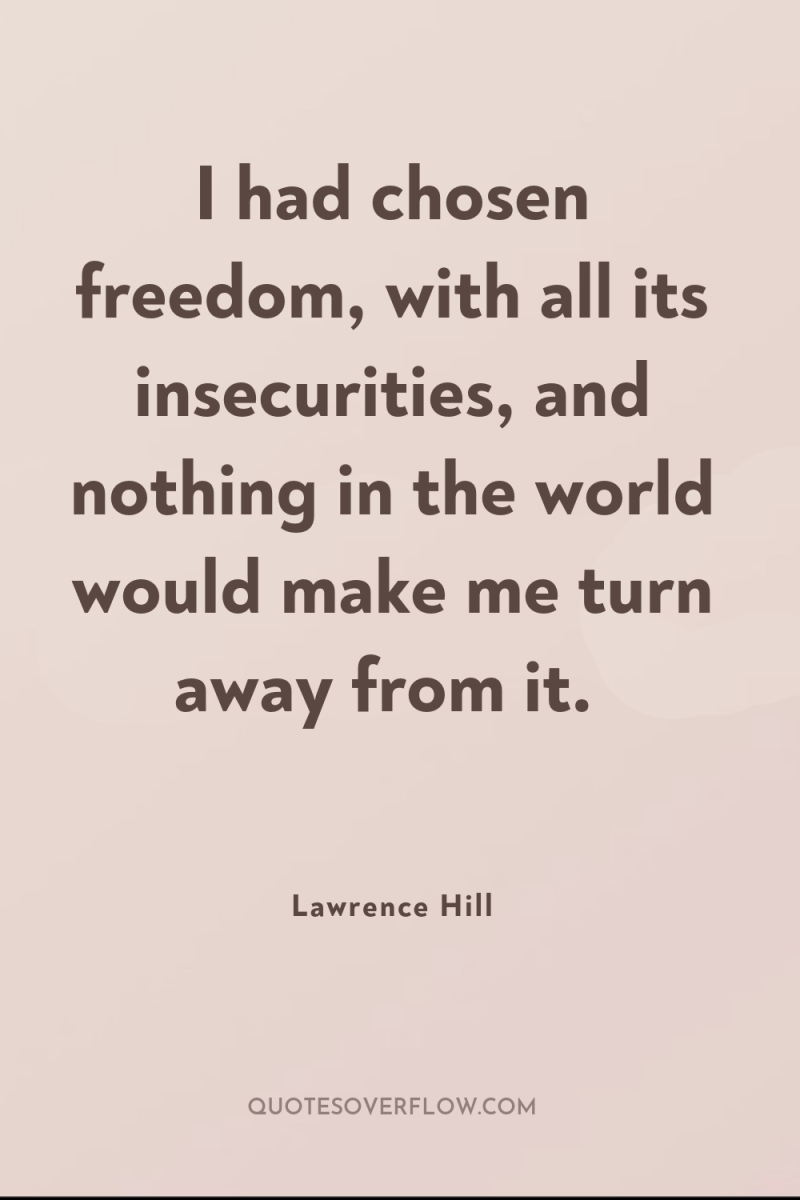
1
No knowledge about self is self-slavery!Israelmore Ayivor

2
I had chosen freedom, with all its insecurities, and nothing in the world would make me turn away from it.Lawrence Hill
3
Some say that because the United States was wrong before, it cannot possibly be right now, or has not the right to be right. (The British Empire sent a fleet to Africa and the Caribbean to maintain the slave trade while the very same empire later sent another fleet to enforce abolition. I would not have opposed the second policy because of my objections to the first; rather it seems to me that the second policy was morally necessitated by its predecessor.) .Christopher Hitchens
4
That, I decided, was what it meant to be a slave: your past didn't matter, in the present you were invisible and you had no claim on the future.Lawrence Hill
5
Older forms of indentured servanthood and the bond-service of biblical times had often been harsh, but Christian abolitionists concluded that race-based, life-long chattel slavery, established through kidnapping, could not be squared with biblical teaching either in the Old Testament or the New.Timothy J. Keller
6
I would have to confess that in the land of the toubabu, I had managed to save only myself.Lawrence Hill
7
The truth is that any figure of Africans imported into the Americas which is narrowly based on the surviving records is bound to be low, because there were so many people at the time who had a vested interest in smuggling slaves (and withholding data. Nevertheless, if the low figure of ten million was accepted as basis for evaluating the impact of slaving on Africa as a whole, the conclusions that could legitimately be drawn would confound those who attempt to make light of the experience of the rape of Africans from 1445 to 1870. Pg. 96.Walter Rodney
8
On any basic figure of the Africans landed alive in the Americas, one would have to make several extensions- starting with a calculation to cover mortality in transshipment. The Atlantic crossing, or “Middle Passage, ” as it was called by European slavers, was notorious for the number of deaths incurred, averaging in the vicinity of 15-20 per cent. There were also numerous deaths in Africa between time of capture and time of embarkation, especially in cases where captives had to travel hundreds of miles to the coast. Most important of all (given that warfare was the principal means of obtaining captives) it is necessary to make some estimate of the number of people killed and injured so as to extract the millions who were taken alive and sound. The resultant figure would be many times the millions landed alive outside of Africa, and it is that figure which represents the number of Africans directly removed from the population and labor force of Africa because of the establishment of slave production by Europeans. Pg. 96.Walter Rodney
9
Even a goat got to be a goat." Esperança's comments about slaves during the triangular slave trade.Tanja Kobasic
10
Development means a capacity for self-sustaining growth. It means that an economy must register advances which in turn will promote further progress. The loss of industry and skill in Africa was extremely small, if we measure it from the viewpoint of modern scientific achievements or even by the standards of England in the late eighteenth century. However, it must be borne in mind that to be held back at one stage means that it is impossible to go on to a further stage. When a person is forced to leave school after only two years of primary school education, it is no reflection on him that he is academically and intellectually less developed than someone who had the opportunity to be schooled right through to university level. What Africa experienced in the early centuries of trade was precisely a loss of development opportunity, and this is of greatest importance. Pg. 105 .Walter Rodney
11
Many guilty consciences have been created by the slave trade. Europeans know that they carried on the slave trade, and Africans are aware that the trade would have been impossible if certain Africans did not cooperate with slave ships. To ease their guilty consciences, Europeans try to throw the major responsibility for the slave trade on to the Africans. One major author on the slave trade (appropriately titled Sins of Our Fathers) explained how many white people urged him to state that the trade was the responsibility of African chiefs, and that Europeans merely turned up to buy captives- as though without European demand there would have been captives sitting on the beach by the millions! Issues such as those are not the principal concern of this study, but they can be correctly approached only after understanding that Europe became the center of a world-wide system and that it was European capitalism which set slavery and the Atlantic slave trade in motion. Pg. 82 .Walter Rodney
12
Society has an embarrassing history of denialCarolyn Spring
13
That is what the Slave Trade was all about. Not death from poxes and musketry and whippings and malnutrition and melancholy and suicide: death itself. For before the white men came to Guinea to strip-mine field hands.... black people did not die ... the decedent ... took up residence in an afterworld that was in many ways indistinguishable from his former estate.David Bradley